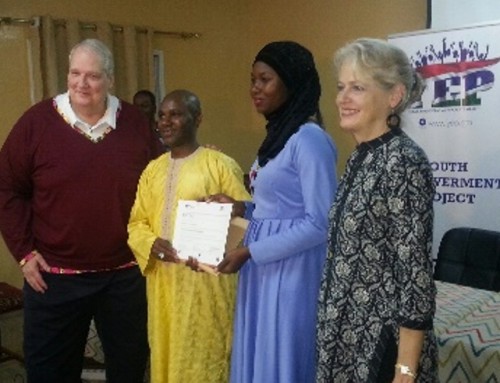By Abdoukarim Sanneh
Indian social activist and the winner of 2004 Goldman Environmental Prize, Rachida Bee, stated: “We are not expendable. We are not flowers to be offered at the altar of profit and power. We are dancing flames committed to conquering darkness. We are challenging those who threaten the survival of the planet and the magic and mystery of life”.
From the melting of polar icecaps, the ecocide of Congo and Amazon rainforest and the looming threat of desertification in the Sahel, our human civilisation is confronted with tremendous environmental challenges in the form of climate change/global warming, pollution, loss of biodiversity, deforestation and desertification. These deepening ecological crisis our generation is witnessing is likely to get worse because our pattern of resources consumption and production. According to the 2016 Living Planet Report, the earth’s regenerative capacity can no longer keep the demand because people are turning resources into waste faster than nature can turn waste back into resources.
Exercising and enjoying human right is necessary for human development. Indian economist and philosopher and 1998 Nobel Prize for Economics winner, Amartya Sen stated that development in essence means freedom. Human rights to an extent help us to enlarge our inherent traits, attitude and talents to meet our objective needs. Life livelihoods, culture and society are all aspect of human subsistence and their maintenance is a fundamental human rights. With the recent development within the human rights spectrum, the destruction of the environment is seen as a violation of human rights because people cannot enjoy if their environment becomes impaired and can no longer sustain livelihood. Human rights under the purview of our social and environmental development identifies that for human communities to survive they must have a sufficient and secured standard of living.
They must be sheltered from injurious hazardous substance and be empowered to preserve and allocate natural resources. Human rights with a value framework such as respect, dignity, equality, non-discrimination, participatory governance and life itself cannot be achieved without these in place.
There is a strong academic debate on human rights and the environment, which theoretical is link to the concepts of development, democracy and sustainability issues. There is a school of thought that link to anthropocentrism and ecocentrism. Anthropocentrism focuses on human being in environmental protection and conservation and Ecocentralism that advocates the non-human beings and entities, for their own worth, regardless of human interests. The rights of nature is ecocentric dimension of human rights discourse and the connection between human beings and the ecosystem services makes rights more ecocentric and less exclusively anthropocentric.
Environmental issues are often transboundary because interdependencies of ecological commons and because of the threat our natural ecological system and there is proliferation of international agreement between nation states to deal with global environmental issues. Global environmental issues since the rise of environmental diplomacy between sovereign states are often, dealt through international environmental laws, international environmental treaties and declarations. In many occasions some of these treaties and declaration are sometimes transpose into national and domestic laws and regulations but yet in many part of the world this does not reverse the destruction of the natural ecosystems and protect the people especially the most disadvantaged and vulnerable communities of our planet from the devastating effects of environmental despoliation.
There is no one way of dealing with global environmental change and many through environmental laws and regulations but in recent years, global environmental activism is seen as a human rights issue and the advocacy is that the human rights system should potentially address the effects of environmental degradation on human beings. With reference to matters relating to human rights instruments and environmental protection, the problem is that most of the human rights treaties were drafted and adopted, before environmental protection become a matter of international concern. Other than few references such as rights to life and health, there is no not much reference to environmental matters. Currently human rights approaches to environmental issues are gaining international recognition.
In 2008, the United Nation Human Rights Council declared climate change a human rights issue. There is a strong advocacy for climate change justice and governance in current climate change debate. A decade before this declaration, in 1989 Hague Declaration on the Environment linked rights to life to a healthy environment. The right to life is well-established in international human rights laws such as Article 3 of the 1948 Universal Declaration of Human Rights, Article 3 of International Covenant on Civil and Political Rights, Article 4 of African Charter on Human and Peoples’ Rights (Banjul Charter) Article 2 of the European Convention on Human Rights (European Convention).
Beyond human rights instruments, in the field of political ecology, there is strong debate on environmental democracy theory and international provisions of environmental procedural rights. The environmental democracy theory brings democratic governance into the domain of ecological sustainability with the remit of environmental procedural rights such as the rights to participation remedies and access to justice, citizens’ empowerment, public environmental decision making. There is a strong link between procedural rights and environmental issues.
According to the 1982 World Charter for Nature stated “that all persons, in accordance with their national legislation, shall have the opportunity to participate, individually or with others, in the formulation of decisions of direct concern to their environment, and shall have access to means of redress when their has suffered damage or degradation”.
The Brundland Commission Report Our Common Future is a blueprint of sustainable development that led to the Rio Earth Summit on Environment and Development. In its Principles 6 of the proposed Legal Principles for Environmental Protection and Sustainable Development, it urges states to “inform in a timely manner all persons likely to be significantly affected by a planned activity and to grant then equal access and due process in administrative and judicial proceedings”. Today there is a serious campaign around to recognise ‘ecocide’ in the same way as genocide is recognised in the Rome Status in the advocacy for what in eco-politics call third generation rights or solidarity rights. In essence, whether to fit the environment into traditional human rights or to expand the theory to include the third generation of human rights is a key question for the future recognition and implementation of environmental rights.
The author is a holder of postgraduate MSc in Environment and International Development from the University of East Anglia, School of International Development and BSc honours in Environmental Science from the University of Bolton. He currently works in the public sector in North London
Article Views:
39





